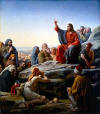Text:
Watch out! Don’t do your good deeds publicly, to be admired by others, for you will lose the reward from your Father in heaven. When you give to someone in need, don’t do as the hypocrites do—blowing trumpets in the synagogues and streets to call attention to their acts of charity! I tell you the truth, they have received all the reward they will ever get. But when you give to someone in need, don’t let your left hand know what your right hand is doing. Give your gifts in private, and your Father, who sees everything, will reward you. When you pray, don’t be like the hypocrites who love to pray publicly on street corners and in the synagogues where everyone can see them. I tell you the truth, that is all the reward they will ever get. But when you pray, go away by yourself, shut the door behind you, and pray to your Father in private. Then your Father, who sees everything, will reward you… And when you fast, don’t make it obvious, as the hypocrites do, for they try to look miserable and disheveled so people will admire them for their fasting. I tell you the truth, that is the only reward they will ever get. But when you fast, comb your hair and wash your face. Then no one will notice that you are fasting, except your Father, who knows what you do in private. And your Father, who sees everything, will reward you.
The foundation of the Kingdom of God is an unshakable JOY that GROWS from the bottom up.
Overall Commentary: 🌎
Jesus is now discussing the foundation of joy in our relationship with God. We are about to have a sincere relationship with Him without anything else added. This authentic relationship with God has nothing to do with any outside stimulus.
After speaking about living a holy life from the inside out, it can become vital that we do this for the right reasons and the right motives. Jesus stops us in our tracks and sends up a flare. He is warning us not to do everything He has mentioned in the previous text for the glory of men. If so, we will receive a hallow, momentary reward.
To guard our joy, Jesus says you need to CHECK YOURSELF BEFORE YOU WRECK YOURSELF.
What does Jesus want us to keep a check on? He's going to contrast the difference between hypocrites and faithful disciples.
Hypocrite- PERFORMS because they NEED value.
- The word hypocrite has been so overly used in the modern church that we may not know precisely what it means. The greek word for this literally means an actor in a play. The mental image immediately appearing for the original listeners would have been an actor on a stage with a mask playing a role.
Disciple- SERVES because they HAVE value.
- A true and faithful disciple does not live on a stage hoping for the applause of men. They live for the applause of an audience of One. They serve others because they have already been served so well by God.
Verse 1: The overarching principle. (Check Yourself)
Cross-references: Matthew 23.5, John 12.43, Hebrews 6.10, Galatians 6.12
"Watch Out!"- This statement was a warning. The equivalent would be yelling at someone to be careful before they fall into a hole. It is a literal warning that danger is ahead.
"Good Deeds"- Holy Lifestyle. The original Greek word means more than doing occasional good deeds. It is the lifestyle or "living out loud" our faith. It is a holy lifestyle that brings glory to the Lord. This would have been referring back to Jesus's statements in the previous texts.
"Lose your reward from the Father." He is saying there IS a reward. Notice Jesus is saying there is a reward for living a holy life. We don't just do it because God said so. That would be enough. However, there are significant benefits to living for God and living the way He has designed our lives to be.
Verse 2-4- Jesus says to guard our joy; we must check our MOTIVES when SERVING OTHERS.
Cross-references: 2 Corinthains 9.6-15, John 5:41, 1 John 3:17-19, John 7:4, Jeremiah 17:10
Jesus gives three examples of what it looks like to "Check yourself" and be sure our motives match our profession. The first is the idea of giving and serving others. We serve others with more than just our finances. We give to others our time, our talent, and our treasure.
It is interesting to understand that we will receive a reward when we give. The difference is who it is from. Here is the difference:
Hypocrite- "Look at how GOOD I am."
Disciple- Experience how GOOD He is.
When we serve and give to be honored by people, we can receive the momentary reward of gratitude. That is fine, and there is nothing wrong with being honored for a job well done or helping when a need is present. However, if that is the only reason you give, that is the only reward you will get.
However, when you give as an act of worship to the Lord, you can receive so much more from Him. God knows what we need more than we do. There are so many rewards He is ready to bless His children with.
A Possible reward: Joy grows as God uses me to be someone else's MIRACLE.
I have had the honor of blessing someone without them knowing about it. Can I tell you, it's incredible. When you know God has met someone's need and used you to do it, there is nothing better.
(Matthew 25:40) I tell you the truth, when you did it to one of the least of these my brothers and sisters, you were doing it to me!
Test
Is the only time you give when others ask or to be seen?
Verse 5-7- Jesus says to guard our joy; we must check our INTENTIONS when we WORSHIP.
Cross-references: Luke 18.10-11, Isaiah 55.6-7, Jeremiah 29.12, James 4.6, 2 Kings 4.33, Acts 9.40, Ecclesiastes 5.2-3, 1 Kings 18.26-29, Daniel 9.18-19
communicate with God through prayer. Have you ever talked to someone but did so in a way that others would overhear you? I remember experiencing this one time. I had a friend who liked a girl. He was talking to me about his new job but was trying to let HER know he had a good job. Honestly, it was a little off-putting. Come on, man. We're having a conversation. This is what Jesus is talking about. Jesus challenges why we pray.
The example Jesus uses is when the Pharisees would pray so others could hear. According to history, religious leaders prayed three times a day. Many times, it is possible they would know when it was almost time to pray, then they would go out into town so they would "oops" get caught in public and have to pray there so everyone could see. Jesus is saying they have their reward. Here is the difference between a hypocrite and a disciple.
Hypocrite- "Look at how POWERFUL I am."
Disciple- Experience how POWERFUL He is.
Jesus is not saying we should never pray in public. There are many times when the Bible speaks about the opposite. The issue is why we pray in public. Our primary platform should always be our private closet. There, we will experience God's power and be rewarded by the Lord.
If we pray in public, we may receive momentary accolades for our excellent oratory skills. However, if we pray in private, we can experience the power of God.
A Possible reward: Joy grows as God HEALS me through daily FELLOWSHIP with Him.
(Philippians 3:10) I want to know Christ and experience the mighty power that raised him from the dead. I want to suffer with him, sharing in his death.
Test
Do you pursue God the same in private as in public?
Verse 16-18- Jesus says to guard our joy; we must check our POSTURE when we FAST.
Cross-references: Isaiah 58.3-5, Matthew 9.14-15, Nehemiah 1.4, Luke 18.12, Daniel 9.3, Ruth 3.3, Ecclesiastes 9.8, 2 Samuel 12.20, 2 Corinthians 10:18, Colossians 3:22-24
Jesus has one more example to share with us. He is going to talk about a spiritual "four-letter-word" called fasting. Fasting is a spiritual discipline where we do without something we want so we can focus on our need for God. For the most part, fasting has almost always been associated with not eating for a period of time.
When Jesus said this to the original audience, it was required for all Jewish people to fast one day a year, the Day of Atonement. On that day, they were too fast, a sign of repentance. There is even evidence in the Old Testament that they should walk around mourning over their sin. However, the Pharisees would fast twice a week. When doing so, they would make sure you knew it. They wouldn't bathe and would look like they were suffering.
Jesus says this is how you get a momentary reward. This is how you can tell the difference in your own heart.
Hypocrite- "Look at how DEDICATED I am." Disciple- Experience how FAITHFUL He is.
The early church had a letter that was not considered inspired, so it was not placed in the canon of Scripture. However, it was considered helpful, so it was passed to different churches. It was called the Didache. The Didache recommended the early continue the discipline of fasting but be careful to do it for the right reasons.
When we fast, we remind ourselves of our dependence on God. Fasting is a continual prayer before Him. That is why we fast in secret. We must be careful we are praying to God and not to people.
A Possible reward: Joy grows as I hear God SPEAK TO ME.
(Ezra 8:23) So we fasted and earnestly prayed that our God would take care of us, and he heard our prayer.
Test
Have you ever fasted without being having a reason?
Links on Fasting:
- What is Biblical Fasting and Does It Work?
- Fasting for Beginners
- Why Should I Fast? 7 Examples of Fasting in the Bible
- What Exactly is Fasting All About?
An unshakable foundation is knowing YOUR FATHER SEES YOU.
The bottom line is this. We have a Heavenly Father who wants to be in close fellowship with us. He wants to bless us. So, when we do these things, we "watch out" and keep our motives in the right place, so we do not lose the reward He wishes to give.
(1 John 3:1) See how very much our Father loves us, for he calls us his children, and that is what we are!

Questions/Journal Prompts for reflection
- What was your number one “next step” from this week?
- Do you ever struggle to not live for the “likes” of others?
- Have you ever fasted before? Tell us about it.
- Why do you think motives matter so much?
Resources
























